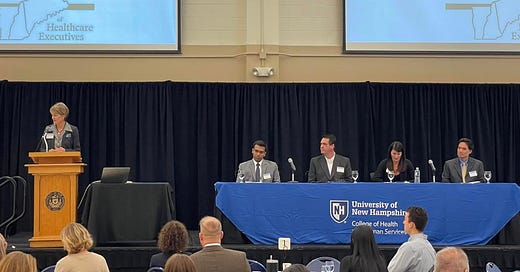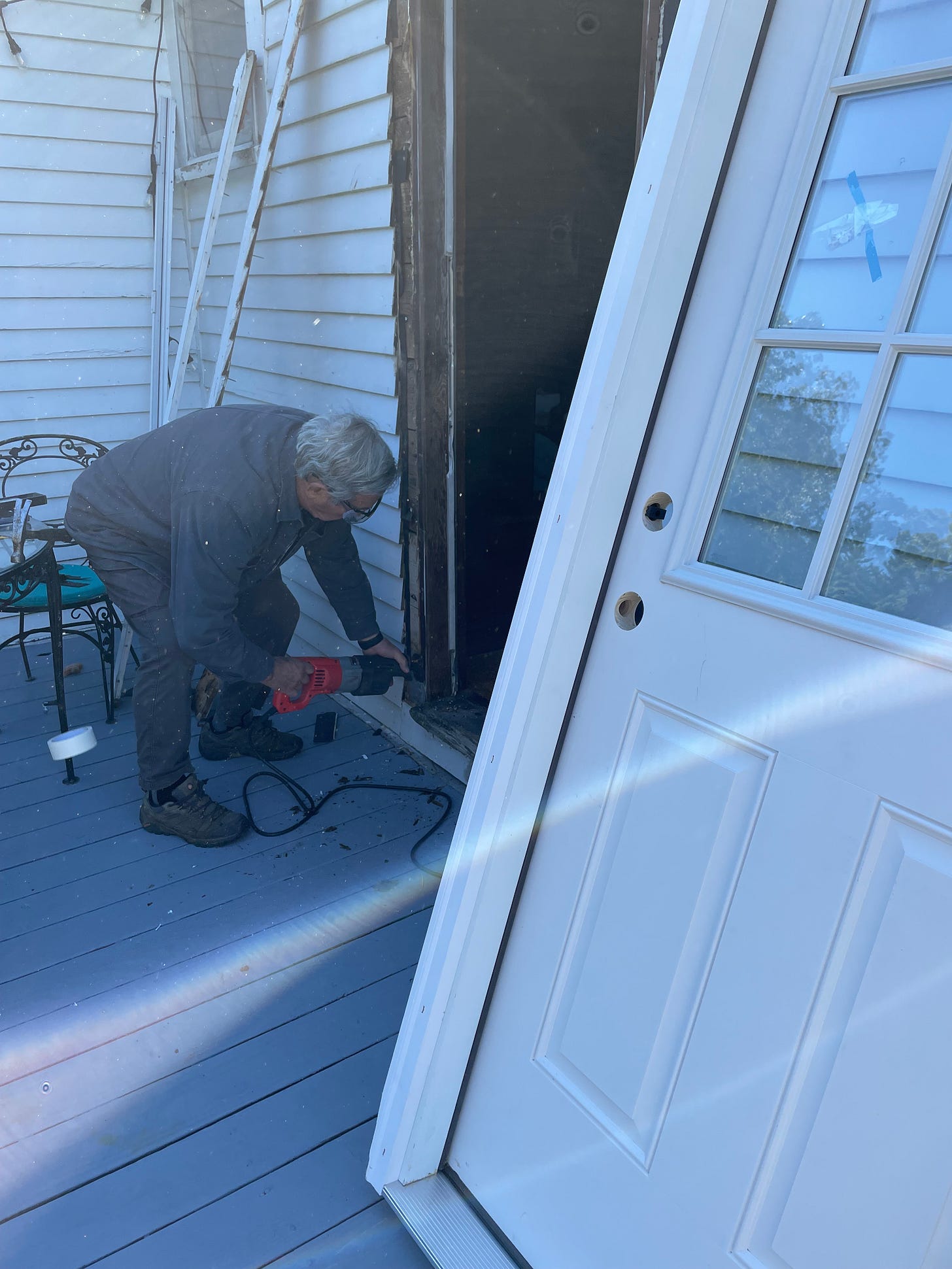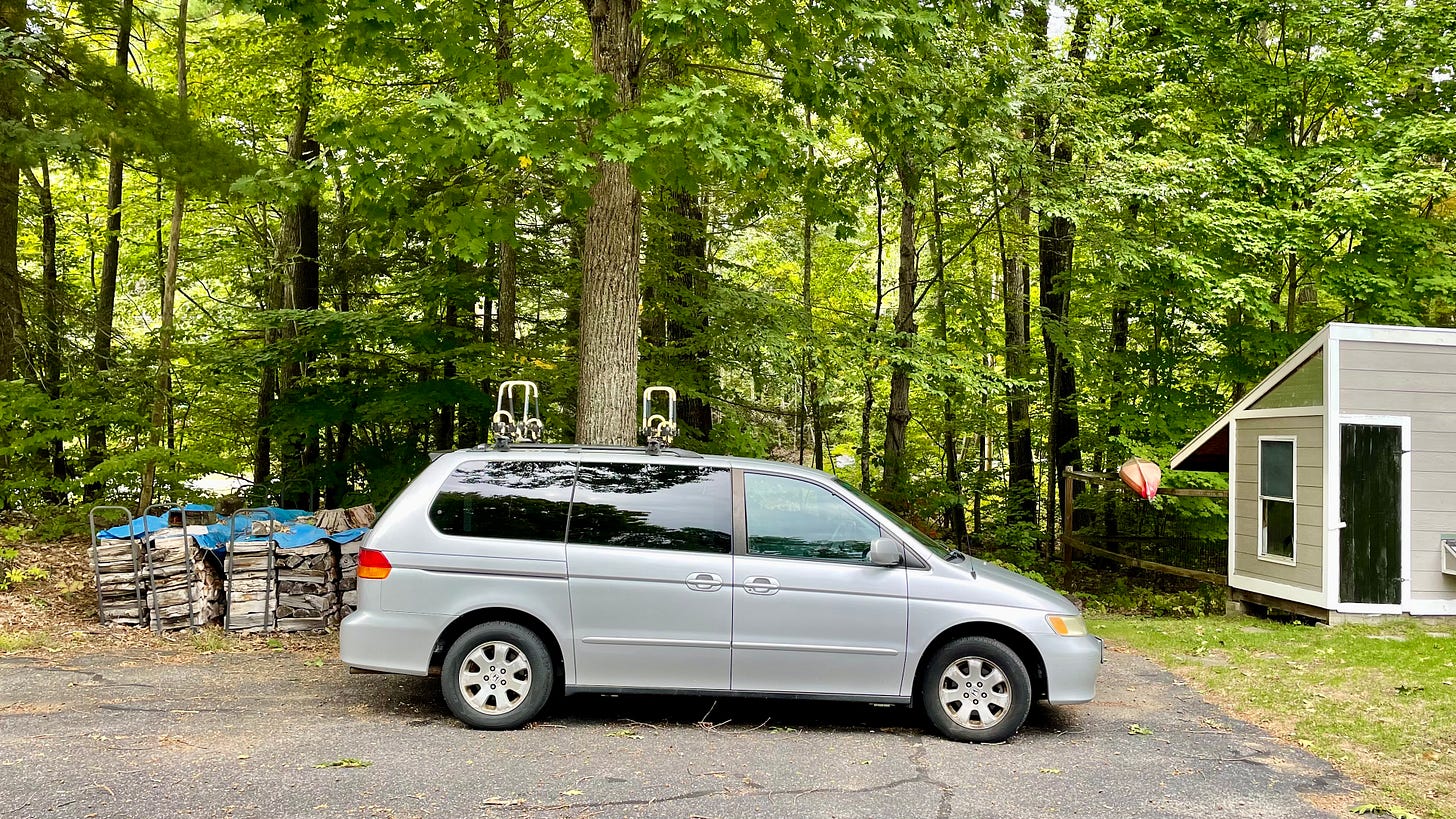Greetings from the University of New Hampshire! It’s Sunday night and I am just getting this week’s newsletter out to you. It’s been a crazy, but very good week. First, and most exciting, we had our first Shaping the Future conference since fall of 2019. This was the fifth Shaping the Future event. It’s a conference we run jointly with the Northern New England Association of Healthcare Executives (NNEAHE), the local chapter of the American College of Healthcare Executives (ACHE). We bring in a fabulous line up of executives from around Northern New England to speak about current and future issues in leadership and health policy, and the students get to participate in the conference. It’s a great event for all. This year’s line up is here, and with the keynote speaker being John Fernandez, the CEO of Mass Eye and Ear and president of the Mass General Brigham Integrated Care. (pic above is of our policy panel featuring my colleague from UNH Law, Lucy Hodder, Dr. Aolok Khole, an Infectious Disease physician from Cheshire Medical Center, Mike Peterson, the CEO of Androscoggin Valley Hospital, Maria Proulx, President of Anthem Blue Cross and Blue Shield in New Hampshire, and Dr. Ben Chan, the NH State Epidemiologist. It was so great to be back in person.
Putting on a conference is a lot of work, so to celebrate, I baked some vanilla cupcakes with almond buttercream frosting, as one does after months of preparation to pull off a conference. (recipe here, I had to bake mine for about 5 minutes longer - very wet recipe - but the end result was excellent).
On Thursday I had a chance to present a “spark talk” to the Association of University Programs in Health Administration’s (AUPHA) Management Forum. My talk was titled, “The “do” of Health Administration Education” in which I compared being professor of health administration to a martial art like ken-do. The suffix “do” means way in Japanese, so I was making an argument that following our specific competence could be a way to enlightenment. The session was recorded - I’ll share the video when it’s available. It was fun - a five minute presentation meant to inspire further thought.
And yesterday I removed an exterior door at my daughter’s house, including the frame, and installed a new frame and door with my father. That was also stressful, but thanks to his skill, we were able to get the door in and locked up tight.
When I talked about Meaning = competence x connection x contribution, I am feeling very full after this week. I challenged myself several times; I feel like I made an impact on colleagues, students, and my daughter; and I felt connected to all of the above. Plus the cupcakes were delicious.
So it’s been a busy few days here, but as usual, willing good for all of you, I present you with the links!
Read
What: The Writer’s Almanac, Starting the Subaru at Five Below
https://writersalmanac.publicradio.org/index.php%3Fdate=2005%252F01%252F05.html
Why: This is a lovely poem by Raymond Carver that reminded me of my cars when I was a kid, and… The Adventure Van. I know you grieved with me when I told you that I had sold the Adventure Van to help out a friend. Well, that friend no longer needed the Adventure Van so she has returned home, mission complete.
What’s funny about this turn of events is I think we all appreciate her a little more than we did before she left us.
I came across this poem by Carver in a volume of poetry edited by Garrison Keillor, the mind and voice behind The Writer’s Almanac. At 18 years old, she’s got 190,000 miles on her now, neither side sliding door works automatically anymore, and I don’t open the driver’s side one for fear I won’t get it closed again. It has a water leak around the windshield, and let’s be honest, it smells a bit like a mud flat from carrying my kayak gear. But she’s pretty darn great.
Also, this poem was appropriate because I took the air conditioners out of our windows here at the Last Homely House this past weekend. Winter is coming.
**
What: Pew Research Center, As Partisan Hostility Grows, Signs of Frustration With the Two-Party System
Why: Look at the graphs in this document and see how bad things have gotten in a short period of time.
Today, 72% of Republicans regard Democrats as more immoral, and 63% of Democrats say the same about Republicans.
The pattern is similar with other negative partisan stereotypes: 72% of Republicans and 64% of Democrats say people in the opposing party are more dishonest than other Americans.
These rates are almost twice as bad as they were in 2016. There’s a lot more in the article.
**
What: US Bureau of Labor Statistics, Earnings and Unemployment Rates by Education Attainment, 2021
https://www.bls.gov/emp/chart-unemployment-earnings-education.htm
Why: Why are we seeing rising polarization?
The median worker with a bachelor’s degree makes 65% more than the median worker with only a high school diploma, 113% more than the median worker who did not finish high school. Furthermore, workers with only a high school diploma face a 77% higher unemployment rate than people with a bachelor’s degree, and people with less than a high school diploma face an unemployment rate 137% higher than those with a bachelor’s degree.
When we talk about using the power of the Federal Government to transfer wealth, we should generally do it from those who are better off to those who are worse off. In my opinion, the loan forgiveness program the Biden administration has proposed does the opposite. This sort of program creates more class animosity and plays into the political polarization of the country, since the parties appear to be sorting based on education level.
**
What: Persuasion, Paths to Depolarization, by Francis Fukuyama.
Why: I note above the ongoing mistakes by the Biden administration that are leading to further polarization. Every time I hear the Democratic Party leadership proposing large-scale, divisive bills, I feel a bit betrayed. When I voted for President Biden, I had hoped he would lead as a centrist, helping to heal the country. Instead, as Fukuyama says, “Once elected, however, Biden governed not from the center of the country, but from the center of his party.”
Fukuyama offers the following:
To summarize: the most direct path out of polarization is for the Democrats to clearly move to occupy the moderate center of American politics and win elections on that basis. They can do this by passing sensible economic and social policies that demonstrate the possibility of effective government, and by breaking cleanly with the cultural agenda of their own left wing. That is what many of us hoped Joe Biden would do after 2020. Whether he and the current leadership of the Democratic Party are capable of pulling off anything remotely like this is unknown, and time is getting very short. Nor is it clear that there is a viable alternative leadership within the party. If the Democrats were to recover this ground and start to win elections more consistently, the Republicans would have to recognize that Trump had led them into a dead end and that they needed to appeal not to their own extremist voters, but to the center.
I have some hope that Republicans will also reject Trumpism, but I suspect, as Fukuyama suggests, the Democratic party has the best chance of rejecting their Progressive extremists. The whole essay is worth reading.
**
What: Marginal Revolution, Still under-policed and over-imprisoned
Why: Short post by economist Alex Tabarrok discusses new research on crime, and the fact that the US relies too much on harsh punishments and too little on policing.
When I was doing research on the economics of crime, one of the classic treatments was an article by Nobel Laureate Gary Becker. The basic argument was that you could prevent crime by balancing the amount of policing (detecting crime) and the severity of punishments. You could spend less on policing if you had really severe punishments because, while you knew you might get away with, say, jay-walking most of the time, if the law required summary execution if you were caught, even a small probability of being caught would discourage jay-walking. Thus society could find an optimal level of each. The argument in this post and the supporting paper is that the US is out of whack - we punish too harshly - too close to summary execution for jay-walking - and we do not invest enough in detecting crimes. If you spend a lot on detecting crime, you can have lighter punishments. As it turns out from empirical evidence, higher levels of policing (detecting) result in lower levels of crime even with light punishment.
The charts in the post are worth looking at.
So, “Defund the Police” is, as Fukuyama mentions in the article above, indeed one of the dumbest policies ever proposed.
**
Watch
What: Conor Neill, 3 things People need from a Leader, according to Alan Mulally ex-CEO of Ford (4 min)
Why: 1) Who are you?, 2) Do you see me?, and 3) Where are we going?
Simple, but not easy. Neill is always interesting.
**
Listen
What: Uncommon Knowledge, Do Not Defund: Roland Fryer and Rafael Mangual on Crime and Policing in the 21st Century (57 min)
Why: Excellent discussion of criminal justice reform and ties directly to the Marginal Revolution post I discussed above about under-policing.
Thanks for reading and see you next week! If you come across any interesting stories, won't you send them my way? I'd love to hear what you think of these suggestions, and I'd love to get suggestions from you. Feel free to drop me a line at mark.bonica@unh.edu , or you can tweet to me at @mbonica .
If you’re looking for a searchable archive, you can see my draft folder here: https://drive.google.com/drive/folders/1jwGLdjsb1WKtgH_2C-_3VvrYCtqLplFO?usp=sharing
Finally, if you find these links interesting, won’t you tell a friend? They can subscribe here: https://markbonica.substack.com/welcome
See you next week!
Mark
“The meaning of life is to find your gift. The purpose of life is to give it away.” – Pablo Picaso








